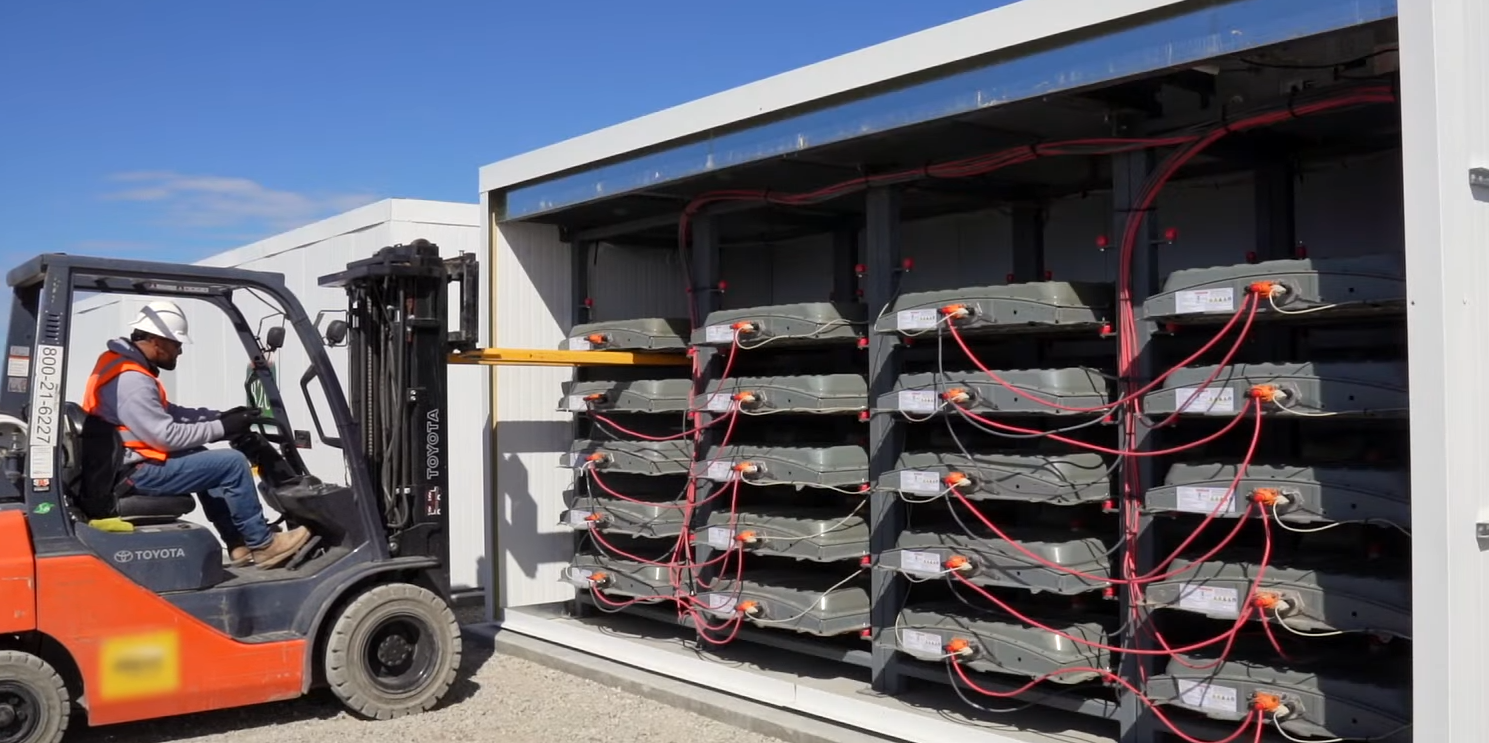I heard someone said that, at the end EV will cost you almost the same as gasoline vehicle, if you have to change the expensive battery every so often. Can someone please give me more info on this? Thank you so much.
You know what you’ll never have to do to an electric vehicle?
Replace a stolen catalytic converter.
Makes me wonder when battery theft will become a thing.
They weight like half a tonne. It’s unlikely to become common.
Maybe as common as ATM machine thefts that do happen rarely.
But they’re not worth nearly as much.
Easier just to steal the car at that point
The batteries literally weighs a ton, so that means they’d have to steal the whole car first then part it out. Just like any other chop shop parts crime.
Too heavy, too integrated into the design. Might as well worry about people stealing your transmission or rack & pinion (TFW: that’s what your car uses to translate ‘turning the wheel’ into turning the wheels).
It won’t.
A gas car costs twice as much as a gas car after like 100k miles or so… you end up paying for some random ass shit that broke every couple months. Alternator here, transmission there, radiator, head gasket, O2 sensors, rusted out muffler, injectors… it’s not like your gas motor just keeps on trucking forever and doesn’t nickel and dime the fuck out of you as it ages. An EV is mainly just gonna lose some capacity as it gets elderly, and isn’t likely to have random little repairs as often.
If you ain’t super well off, you roll your shit til the wheels fall off, and with an EV, that’s just going to mean that the Tesla that goes 300 miles on a charge today, in ten years, is gonna be a Tesla that goes 150 miles on a charge, and there’s going to be people that will rock that old ass battery pack for as long as itll keep rocking, and a lot of those packs aren’t actually going to get replaced at the age everyone is claiming they will be.
Battery pack might be the whole ass cost of the car, but poo-pooing EVs over it is disingenuous if you ask me.
that’s just going to mean that the Tesla that goes 300 miles on a charge today, in ten years, is gonna be a Tesla that goes 150 miles on a charge, and there’s going to be people that will rock that old ass battery pack for as long as itll keep rocking
That 150 mile battery pack is still hugely useful with zero refurbishment as a stationary utility power battery. A Tesla model 3 Long Range (330 mile version) is 75kwh. A brand new Tesla Powerwall is 13.5kwh. So that old 150 mile battery is equal to the capacity of 5 and half brand new Tesla Powerwalls.
There’s already a solar power generating company using old Nissan Leaf batteries to store excess generated electricity, then putting that electricity back on the grid at peak times to earn money.

The main counter to that is that EVs are very difficult to repair on your own, so when something breaks, you’re going to be taking it to a specialist shop. While you’re right in saying that ICE components break, let’s not act like electric motors are indestructible pieces of machinery
I have never in my life repaired a car on my own, so that means nothing to me.
Bought an electric car in early 2020. Costs me a few bucks a months to keep charged, tops. I have spent literally 0 dollars on maintenance for it. There are just plain fewer moving parts. It’s a battery, an electric motor, and that’s about it.
So that’s 3.5 years (so far) of paying practically nothing to operate a smooth-driving, quiet vehicle that still gets almost 300 miles per charge and operates primarily off the wind power I buy from my utility company.
I expect to drive this one until it can’t hold a charge anymore, and then I’ll get another one.
How is an EV harder to repair on your own than an ICE? I think you’re wildly underestimating the shade tree tinkerers of the world.
Sure, an EV contains a bunch of proprietary software and configuration, but so do ICE vehicles, and people have been hacking that shit for decades. They’ll swap out the whole ass controller if that’s what it takes :)
They’ll swap out the whole ass controller if that’s what it takes :)
And we all know the ass controller is the most important part.
Only if you can control the whole ass, though. There nothing worse than a half-ass controller. . .
But there is sooo little to break on an EV. Mechanically, they are very simple machines. The only repairs we’ve payed for on our 2017 bolt has been a set of tires and wiper blades.
Home maintenance is the same (but far less needed). Major maintenance might be slightly more difficult in terms of the parts being heavier, but it’s also less common to need to service an electric motor than a combination engine.
Battery lifetimes are specced as 80% capacity remaining. So a 300 mile range becomes 240 miles. Still highly usable.
My smaller battery MX Tesla, after 7 years, has gone from 330km to 308km. The degradation is a lot slower than you indicate.
I’m planning on buying a ~ $20k EV and rock it until the battery can’t take me for;m work and back over and I doubt that happens before I sell it to buy a (for realsies) cheap EV truck.
I’ve had an EV as my only vehicle for about 5 years. The biggest cost of maintenance was replacing my tires. Then replacing one of the new tires after I ran over something and put a big hole in one of them.
The regular maintenance on it has been effectively zero. I don’t have any fluids to change (other than windshield wiper fluid) or other regular maintenance tasks other than tire related things. My parents have had an EV for something like 8 or 9 years and their experience has been similar.
Do electric cars not have brake fluid? Should that not be being changed soon in it if you’ve had it 5 years.
I think they do, but you barely use your brakes due to regenerative braking. So you don’t have to change it very often, if ever
Ah completely forgot about regenerative braking! I thought the main reason it needed changed was due to age and water absorbance rather than usage though, but again if regenerative brakes are used heavily then the regular brakes losing a little efficiency is a lot less of a deal.
Brake fluid is hygroscopic – meaning it absorbs water. It’s typically recommended to change it every 2 years.
deleted by creator
Not accounting for rust and weather impact, EV brakes systems last much longer due to regenerative braking from the motors being used before the brake system is engaged.
I wouldn’t discount rust. I’ve had to change my rotors more frequently than pads due to rust (I drive a Prius). That said, I live in a state that oversalts their roads more than an amateur chef.
How often do you change tyrea? Also once a year? I always imagined that due the weight thetyres usage must be higher. Right now i work in a neighborhood with a lot of teslas and i saw that almost all their front tyres are absolutely gone.
If you live in a cold country it’s twice a year to put winter tyres and then the summer ones.
Which you don’t buy every time obviously, but still the change and storage fee is going to be about hundred Euros/dollars each time.
I found that a second set of rims and a splurge on an impact wrench paid for themselves in about 2 years.
Saves a ton over the life of the vehicle!
That’s what happens when you don’t rotate your tires. If you rotate them every 6000 miles or so, they’ll be fine for a while. My stock tires are a year old and still look great.
I’ve changed mine twice in seven years.
No
Thanks for sharing!
The “it’ll cost you a bazillion dollars to replace your battery” thing is stupid. Most batteries will last as long as the car.
“They found that in a community of 15,000 electric cars only 1.5 percent of batteries have been replaced if you exclude massive recalls […] The team also points out that most battery replacements happen when the car is still covered by a warranty.”
I’m not sure looking at the stats like that is really all that useful.
There are two situations where the battery replacement happens:
- The user forks over the money to replace it personally.
- They manage to convince the manufacturer to cover the cost.
It’s definitely not a given that everyone who wants to replace their battery can and does. This post is about longevity, so presumably most of the time in that situation the person will have to cover the cost of replacement themselves.
I want to be clear, I’m not arguing against EVs. I’m just saying this article doesn’t really have enough information to draw a conclusion.
They manage to convince the manufacturer to cover the cost.
Battery warranties are pretty cut-and-dry, there’s little convincing needed.
If the capacity is below the threshold, it gets replaced
This assumes that it’s within the warranty period (or recall period assuming there is a recall). After that the customer absolutely will be on their own for the repairs assuming they don’t have an aftermarket warranty which a fair number of people don’t bother with.
Eight years/100,000 miles for cars in the US, it’s very generous
Shops are already repairing batteries. All EV batteries are made of thousands of cells, of which individual cells can be swapped by any enterprising individual.
Unrelated to the entire discussion on cars: This is important! What you just did is so so important. I WANT to believe that EVs are great, and they probably are, but the study seems somewhat lackluster. An someone needa to point it out, regardless of their own opinion.
As someone who bought a Tesla because my GTI’s engine died at 95k miles, I’ll take my chances with the electricity
The Nissan Leaf seems to be the only one worth being concerned about. Don’t quote me on this but I remember reading the old ones (like 2011ish to around 2016-17) had poor airflow to cool the battery so they lost capacity quicker
They don’t have active cooling/heating like newer EVs do.
The mach E has a recall for battery replacement I believe. Also, the Ford Focus electric came out in 2011 and definitely has an open recall for battery replacement, and some of those cars are out of the warranty period. The Chevy Volt was exploding and was recalled. If the problem with the battery happens outside the recall the owner is responsible for replacement assuming they can afford it.
Lol, this is what I want thanks for the link so I can send it to my wife hahahaha ;)
I have an electric car from 2011. The battery has had no maintenance, and hasn’t been replaced.
So far the car has had 2-3 new 12V batteries, at least one new set of tires, windscreen wipers replaced once, and the air conditioner filter replaced a few times. I’m not aware of any other maintenance done to the car.
I suspect the car could have driven up to 150km (95mi) when new, and is now down to 80km (50mi) range. It gets driven no more than 10km in a day, so I suspect it will still be useful to me for another 10 years.
It has saved me a huge amount in fuel, and has barely cost me anything to run.
You should really change your wipers more. The blades crack and become ineffective with age even if unused. Maybe not every year but every couple years!
Silicone wiper blades last many years and don’t crack. They’re about twice the cost of traditional but worth it in the long run.
My current set is from 2018.
Also if they’re gunked up quick wipe down with the mild solvent of your choice (I use vinegar) will often give them a new lease of life.
Usually the 1st thing I change on any car
Thanks for the info, that sounds like a good deal
You’re more than likely due for a coolant system flush.
I’m fairly certain my car doesn’t have a coolant system, but thanks for the reminder. I often forget these sorts of things.
Out of curiosity what kind of vehicle? Cause most EV’s and Hybrids have a cooling system for the batteries.
It’s a Nissan Leaf, generally known for it’s battery overheating issues.
I also have the refreshed model of the Leaf. It has a higher density battery pack with more tightly spaced cells and still no battery cooling. It will overheat if driven more than 600km (400mi) in one day. When hot, the rapid charging speed drops to about 20kW.
Your car still has coolant for the converter and the charger.
Interesting. From Nissan:
“The recommended service interval of the factory-fill coolant is 200 000km (125 000 miles) or 15 years, whichever comes first. Subsequent replacement … should occur every 80 000km (48 000 miles) or 4 years, whichever comes first.”I guess I’ll put that on my calendar.
I believe this is the total cost of ownership calculation.
https://www.caranddriver.com/shopping-advice/a32494027/ev-vs-gas-cheaper-to-own/
This is great. but maybe factor in if you have solar. I can generate my own free electricity but I can’t generate my own gas no matter how many visits to Taco Bell.
Even without solar there are lots of places to charge for free (slowly, but it adds up)
Also gas is way more expensive than that here in CA. And gas prices fluctuate like crazy. Electric prices generally don’t.
My electric company gives me monthly credits because I let them control when my car charges based on demand. I just set it up to “be ready by 7am”. Combined with solar it makes my charging cost negative.
OMG, my 0.99 L gasoline car is still a lot cheaper than any of the electric options I could come up with. I guess the year of the electric car isn’t here yet. Then again, I couldn’t even charge the car at home, so there’s no hurry to switch any time soon.
The availability on street charging for those without driveway is really the only thing holding back mass adoption, IMHO.
I’ve heard that the electrical grid wouldn’t be able to handle it if every car was electric. Not just the energy production, but also the wires buried under the streets.
If every car was instantly converted to electric, the grid would struggle but not collapse. There is a lot of extra (but more expensive) production capability on the grid, and EV’s are being added gradually, not instantly.
The grid is currently being upgraded to support air conditioners and heat pumps. EV charging can be scheduled for times when the grid is under less load, so EV’s will have a relatively small impact on the grid.
TL:DR: The grid will be fine.
For people who don’t have access to charges at home, like apartment dwellers. Owning an electric vehicle becomes a lot less convenient, cuz you’re not getting the efficiency from solar panels, or late night charging. You’re at the whim of the price of fast chargers.
But the math is constantly changing, it’s good that it’s a viable option for a lot of people. I look forward to a more sustainable future.
To put on my engineers hat for a minute, I honestly would prefer that we switch over to hydrogen fuel cars rather than electric battery powered cars. Batteries are more e-waste, not recyclable, unlike hydrogen.
But that’s a pie in the sky dream
Car batteries last more than 10 years in cars, have a second life as static storage for likely much more than 10 years, and we currently have the ability to recycle over 95% of battery materials into new batteries.
Hydrogen used in fuel cells has a round trip efficiency of around 30% (compared to 90%+ for batteries). If the hydrogen was generated from solar power, we would need 3 times as many solar panels to drive hydrogen cars vs battery cars.
Most (98%+) of all hydrogen is currently made using fossil fuels. The most common method is methane steam reformation. The methane (natural gas) is combined with high pressure, high temperature steam. The methane reacts with the steam to produce hydrogen and carbon dioxide.
The carbon dioxide is usually vented to the atmosphere (some places capture the CO2, and use it to pump oil out of the ground where the CO2 is also released into the atmosphere).
The hydrogen also contains less energy than the methane that was used to make it.You’re absolutely right. But hydrogen is the only path for steady-State totally renewable mobile power. Batteries are consumables, yes the time horizon is long. But they are consumables. Hydrogen is totally renewable. Yes hydrogen manufacture today is usually not renewable, but it can be. We have all the Lego pieces to do it
What’s your definition of consumable?
I would have thoughy that recycling almost 100% of a battery into new batteries would be considered renewable.
95% of the nickel and cobalt. But batteries are more then just the expensive metals.
https://climate.mit.edu/ask-mit/how-well-can-electric-vehicle-batteries-be-recycled
I see great potential in hydrogen, because we could produce lots of it by dumping excess solar and wind energy into electrolysis. That would mean that instead of burning coal, oil and gas in peaker plants, we could use hydrogen for grid balancing. Assuming we had that sort of hydrogen infrastructure for the grid, we could obviously put some of the hydrogen for road vehicle use as well.
In the short term, cost is going to be an issue, but that can be overcome through economies of scale. However, safety is a bit tricky due to the explosive nature of hydrogen. I’ve heard of various creative solutions but they always come with serious drawbacks. So far, storing hydrogen in a pressurized tank seems to be the least awful option out there. On the other hand, electric cars will happily ignite from time to time, so I guess we’ve already accepted a certain level of danger when it comes to vehicles.
Historically, electric cars have caught fire much less often than petrol cars (even accounting for the lower number of EV’s on the road). Most of these have been from a single battery manufacturing line and caused by a single misaligned robot that placed the battery terminals too close together. These batteries have all been recalled under warranty.
There are battery types that are better for grid storage than hydrogen. One of the main drawbacks of hydrogen storage is its low round trip efficiency of around 30%.
Redox flow batteries are easily scalable, liquid metal batteries have very low maintenance costs and long lifespans, and sodium ion batteries are much cheaper than lithium ion batteries. It will be interesting to see if any of these options make mass market.
I’ve seen some videos about redox flow batteries and a bunch of other options that appear to be suitable for the grid. I’m really looking forward to seeingt hose in action, because I believe grid energy storage is absolutelyt crucial for getting rid of coal and oil.
However, even though converting electricity to something and then back to electricity is nice, there are many cases where you can take a shortcut. Various types of industry are using fossil fuels to produce heat, so if you give them electricity, they can produce heat when they need it. That’s not the only way, because you could also reduce the number of conversions by using the energy of windy and sunny days to produce heat and store it in hot sand. Later, when the factory needs the heat but the sun isn’t shining, they can just the heat stored in the sand.
Thanks for the info! :)
It looks like you can construct scenarios where ICE cars are cheaper than EVs by a fine margin, for instance a mid-sized car that you own for just the wrong amount of time in a country with a high gas subsidy (the United States, for instance) that you don’t drive much. However, for most scenarios, it seems you’ll save 10-15% on the total cost of ownership.
The acronyms TCO (total cost of ownership), ICE (internal combustion engine) and EV (electric vehicle) may help you should you decide to continue research on your own.
Interesting read thank you so much.
I have solar panels at home which generate way more than enough for my home and EV (and still costs less than my old electric bill before solar), so I count charging as free.
People here keep mentioning battery degradation and replacement costs. I got a Kia EV6 and I love it. I tried many other EVs at the time earlier in 2023 when I bought it and the EV6 blew them all out of the water on both features, quality, and (surprisingly) price. And they also have a 10 year warranty for the battery. They mentioned that it would also qualify for free replacement under the warranty based on degradation if it’s past a certain amount. I need to pull out the paperwork and check the criteria.
As far as price comparison to ICE vehicles, I think a fully kitted Mazda CX5 is a good comparison. It’s about 42k with 22-27 mpg, so would cost me around $150/mo in gas. Over 10 years that’s $18k for gas. Compare to the EV6 that I got for around $65k. I’ll definitely save that extra $5k in maintenance costs over 10 years.
Due to the fact that it doesn’t have a bunch of moving parts wearing down constantly like an ICE vehicle would, it’ll probably last longer than 10 years. Most ICE vehicles I’ve owned start to become a real hassle after 7 years. I also appreciate not having to constantly get maintenance too.
Helping reduce pollutants is nice, but that’s a bit of a heated discussion due to what’s required in lithium mining. Even so, it at least feels like I’m trying to do the right thing.
And lastly, EVs are just plain more fun to drive! The linear acceleration is a little weird to adjust to, but it means steady and fast acceleration from standstill since you don’t have to change gears, jolting the passengers just to get up to speed. And I don’t feel like accelerating a bit quickly is financially irresponsible either since I’m not burning extra gas to do it. When I’m in my gas car, I can practically see the dollars burning away.
I’m very curious about your experiences of having problems with ICE cars after 7 years … I’ve never owned a car that’s less than 10 years old, and have rarely had problems with them.
It’s morbidly fascinating reading how rich people see the world …
My last vehicle, a Buick, had the engine crap out around 4 years. Something happened with one of the cylinders, can’t remember what. I had to get it towed to a shop and it cost $2k for them to rebuild the engine. I know a major repair like that early into the life of the vehicle is uncommon, but these sorts of things do happen and you just gamble on it every time you buy a vehicle.
And the warranty didn’t cover it?!
Nope
Wow. Like, I can buy a cheap Chinese motorcycle and it’ll come with 3 years warranty, yet Buick can’t manage 4
It’s because they’re not telling you the whole story. A bad engine not covered by warranty? That means they probably ran it out of oil or something.
Quite possibly, along with another commenter who said ICE cars start to give problems at 70,000 miles.
Literally yesterday I was joking that my British friend’s 2005 Seat Leon is just about broken in since it passed 250,000 miles. Still runs like clockwork apparently.
Fuel pumps, exhaust systems, injectors, tuneups, new radiators, belt replacement are all very common after 7 years. Thankfully less common now, but still occurring on many vehicles are head gaskets, transmissions, motor mounts. None of these issues should effect EVs.
I guess they wouldn’t, but I wouldn’t list most of that as being particularly arduous. I got my current car super cheap because it needed the head gasket, I changed it and it’s yet to have any other real problem.
I guess I don’t see cars as fungible, hell if I’d had my way I’d still be driving my first car which was 35 years old when I got it (and you can now get off-the-shelf electric conversions for them these days)
Uh… have you ever owned a car long enough to need new injectors, radiators, or exhaust systems?
I’ve owned three vehicles that surpassed 400,000 miles, with one approaching 600,000 now. I’ve replaced a radiator once, and it was because of a small boulder tossed by a semi. Belts are usually less than $60, and are only replaced after 120,000 or so. Your average driver won’t have to worry about those but once every 5-10 years. I’ve never had to replace a injector system (and if your dealer tries to sell you a service to ‘flush’ or ‘clean’ the injectors, decline; most auto manufacturers recommend not doing anything but replacing, as the service of cleaning/flushing is more likely to cause damage than actually be beneficial).
Fuel pumps are going to be brand-dependent. Don’t buy ford, because good lord they suck and the pumps do go out, but again, I’ve never had to replace a fuel pump (my three are toyota, honda, and volkswagen).
If you pay for a tuneup, you’re either racing or are a fool. One of those use cases isn’t relevant to a discussion about the average person owning a vehicle.
Where do you live? Anywhere that has winter you will be certainly replacing a radiator long before that. I have not owned a vehicle that has made it past 250,000km without needing a new radiator and at least some exhaust work.
You are describing statistically anomalies of automotive maintenance.
Almost none of those issues effect an ICE vehicle after 10 years. I’ve only replaced exhaust systems when they’re damaged, and fuel injectors are almost never changed.
I’ve had all of these issues on my vehicles. Sure, some won’t happen, but all can.
Have you had all of them happen on a car less than ten years old?
The statistical maintenance costs for cars just go up over time, with some pretty big bumps generally every 60k miles or so you put on the car. There are just a ton of straight up wear components on ICEVs from spark plugs to belts to fluids, clutches, seals… if you get unlucky, you end up with a good chance of a semi-major repair or maintenance item every year. If you get lucky, then I guess you post about it on the internet.
I’m in Europe, we usually expect ICE cars to last 200,000km at least. My Dad’s Peugeot had over 500,000km on it when he sold it, his 1991 Toyota’s mileage is unknown since the Speedo cable broke over 10 years ago when it had 250,000km on it.
I got my little Clio cheaply because it needed the head gasket, fixing that took me one day and cost under 100€ to fix, and it’s still running smooth 3 years and 50,000km later.
To throw things away just because they need a little repair seems terribly wasteful to me.
Thanks for sharing your experience 🙏☺️
It has been three years since I got my electric car. So far I have gone to the dealership once a year for maintenance. Under 500 for maintenance in 3 years also well under 100 dollars in charging costs in those three years because I charge it at work most of the time and just sign out 15 mins early to give them free work in trade for charging.
That’s a good deal. Thanks for the info!
Perspective from India:
28% GST for spare parts of electric vehicles and the companies play monopoly by raising the price of the spare parts by 5x to 10x.
If we don’t use original parts sold by them and do maintenance outside the vehicle will not be covered under warranty.
There were many fire accidents due to the hot climate, which requires the warranty in place.
It’s kind of a nightmare to own an electric vehicle in India.
It’s good for someone who drives for more than 50km in a day. They can save on fuel, which will be higher than all other costs. The fossil fuel is 10x higher covering the same distance in an electric vehicle.
That’s good to know, thank you so much.
Every time I am tempted to buy a Hyryder, this is what comes to my mind. I drive at most 50 kms/week. We are probably some years away from this becming an economic reality.
I operated an electric vehicle between 2016 and 2020. All costs included, I paid a bit under 300 EUR per months for 25.000km / year.
I operated different gasoline vehicles between 2007 and 2014. All costs included, I paid a bit under 300 EUR per months for roughly 25.000km/ year.
From that I conclude it doesn’t matter enough to make it a big topic, but at least here in Germany, both electricity and gasoline prices have skyrocketed since, so, who knows. Charging cost may be cheaper if you can charge at home.
Were you able to charge at home or did you have a significant about of charging station use?
mostly charging stations. Originally I planned to load at home but soon after buying I moved houses and had to rely on nearby charging stations.
That’s a big ass caveat in your original post. You really need to edit it to include it.
Why? If anything, charging stations are more expensive than charging at home.
Yes, you would have saved a ton of money charging at home. You presented that they cost the same, but charging at home is much cheaper.
Yeah, but overall battery and charging cost where about half/half. The biggest factor by far was value loss.
It’s not the big difference it may seem.
You cut the charging cost and it is a lot. The numbers I’ve seen in the US are the charging stations will cost you 4x-5x what it will cost you at home.
And fast charging stations is hard on the battery. Slow charging at home is better for battery longevity.
Thanks for the info!
I’m driving a Nissan leaf, and it’s costing me about $180 to drive 10,000 miles (4.2ish mi/kwh average over the past year), compared to about that same amount for under 1,000 miles on my Tacoma. I charge 99% at home using a 120v charger and I back calculated using my average mi/kwh and electricity cost. There’s basically no maintenance, so the only extra cost of ownership is basically tires and brakes. My best guess at the battery degradation so far is about 2.5% per year, but the previous owner went extra lengths to keep the battery in good shape, as do I.
So far it looks like every 4-5 years I can replace the battery at the highest estimate and break even compared to my Tacoma. This is the original battery, still at about 80% capacity from 2016 and almost 50,000 miles.
When it costs the costs are high. Electric vehicles still have coolant (2 different coolant systems, one for the battery pack and one for the electric motor), a hydraulic braking system and tires that will need to be replaced. But one of the best electric cars on the market was the electric ford focus, and they were really reliable. Except when the coolant system leaked onto the high voltage battery connections. When that happens it fries the battery and requires both battery packs to be replaced. To the tune of something like $20K each (from ford). This cars MSRP was something like $30K. The cost is so exorbitant that there are a few companies that will rebuild the cells rather than replace the battery packs themselves. I don’t know for sure whether that would work in the case of the focus, but even then the Labor involved would still also be expensive.
The lifetime of the car may be how long those battery packs are meant to last. But what happens when they don’t get the same range they had when you bought them? Battery tech gets better every single year. We make new strides in longevity, rechargeability, and sustainability. Each year the cost to manufacture them decreases as the process is further dialled in and streamlined. But the cost of cars continues to go up and tax credits for electric vehicles will probably not be the norm once they reach wide scale adoption.
On top of that, Tesla’s in particular have some significant build quality issues recently.
I brought up the focus because they’re out of factory warranty by now and likely to have at least one costly repair in their lifetime. People here are attesting to their own personal experiences with electric vehicles. But there are people out there who don’t have the same experience.
Good point here, thanks for sharing
The problem with coolant leaks in the electric focus is very interesting to me. I’m shocked they would use a conductive fluid if there was any chance it could get into the batteries. Hopefully they changed the design to prevent this situation in the future.
Most coolant for vehicles is half water. It’s a 50/50 mix. My bet is that they never thought it would leak. I can ask but I’m not sure as far as design goes. I know they don’t make an electric focus anymore. But any type of liquid with the right amount of electrolytes in it can cause corrosion on metal wiring.
Makes sense, water kicks ass at heat transfer so I get why they’d use it. Thanks for the info.
Still way cheaper even if you replace the battery when recommended (7 years ish)
Add in the minimal to zero auto maintenance and your EV just keeps getting cheaper every time Tucker’s bronco needs an oil change and filter.
Last time I took my EV in for service the guy just told me to come back in 6 months. Truly hilarious.
No spark plugs, oil changes, no transmission fluid, nothing to leak. No air filter or fuel filter or vacuum hoses or plug wires or whatever they are going to try and sell you.
Plus, fewer brake jobs because of regenerative braking.
I miss a manual transmission but I don’t think I’ll ever go back to gas.
My dream would be an 80s M3 with an electric engine swap. There are electric motors you can just bolt in front of the transmission as a direct replacement for a gasoline engine. I’ve heard most people just put the transmission in 3rd gear and leave it there, but I bet it would be crazy fun to take off from green lights in 2nd and go through the gears while accelerating. Having the best of both worlds imo
Exactly. The sheer convenience of owning an electric vehicle vs a rattle-trap changed the game for me.
Which vehicles or manufacturers specifically suggest replacing a battery at 7 years?
Specifically seven? Idk. Do you want me to look that up for you?
Specifically seven? Idk. Do you want me to look that up for you?
I have not heard of any manufacturer recomending a battery replacement. If you can find any sources I would love to read them.
That’s weird, it’s very common to replace ev batteries as they age because they tend to lose capacity depending on how they’re used.
Maybe if you’ve only used gasoline vehicles up until this point you would not have heard about replacing batteries? Although gasoline car still have batteries which have to be replaced often. EVs just have much bigger batteries than the car batteries you’re used to, if that makes it more relatable.
Delfast recommends ten years max, Nissan recommends 8, most ev batteries lose a significant portion or more(easily 30% ) of capacity before a decade is up, just google any ev company for their company’s recommendation and then weigh that against real world usage and replacement statistics.
Interesting. I guess my 2011 Nissan Leaf would be an outlier then. It’s lost some range, but I think it will keep working for me for at least another 10 years.
That sounds standard. EV batteries can reliably work for 15-20 years depending on how much and how aggressively you drive, how well the batteries were built, how the batteries are recharged, but the effective capacity goes down every year as a matter of the nature of rapidly discharged,/recharged batteries as they’re currently built.
Battery tech is improving rapidly, but we’re nowhere near 100% storage/discharge/recharge efficiency yet that would be more gentle on the chemical and physical makeup of the battery.
Tesla claims their batteries last the life of the car, but they define the life of the car as 160k miles OR 8 years of warranty on their batteries, whichever comes first because batteries just don’t last as long as we’d like them to yet.
“Maintenance” for your battery isn’t something that costs you every month. Nobody is going to open the thing and fiddle with it and turn screws etc.
It all consists of 1. how you are using it and 2. how good is your battery controller, hardware and software.
I have seen an old guy on TV who was driving his Tesla daily as a salesman, and he reported about several hundred thousand miles on his first battery and then twice as much on his second. He said he does never ever charge it above 80% and never discharge below 20%.
It’s worth noting that while NMC batteries shouldn’t be charged over 100% for daily use, LFP batteries should be charged to 100% at least weekly.
LFP batteries are not damaged by being at 100%, and due to the flat discharge curve, the controller only knows how charged the battery is when it’s near 100%. Most of the time it’s calculating the charge left based on how much energy is being used.
Over time, that guess is going to get less accurate. Charging it to full will reset the guess, and keep it accurate.
Only charging to 80% can cause the guess to be off by more than 50% (after quite a long time), leading to the battery running out when the car thinks it has at least 50% left.If you don’t know what battery your car has (and don’t have access to the manual), assuming LFP is safest. Any EV sold after 2022 is likely to use LFP (unless it’s a high performance car), and EV’s sold before 2020 are probably NMC.
New battery chemistries are coming on the market every year, so don’t rely too much on this comment.
It is hard to calculate. Some batteries will last longer because of didferent designs and environment. Sane with impacts of mining. It gets more complex since each country has different laws about how dispose of waste. That said studies i have read put the green point at aroynd 30 to 40 thousand miles.
Now Toyota’s researches found that plug in hybrids are better right now. Do to lower battey cost, and limited supply of batteries.


















